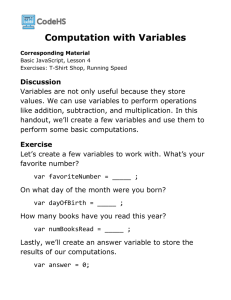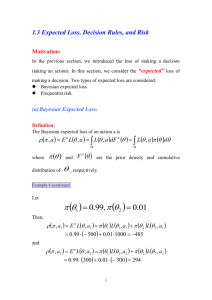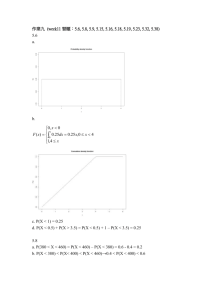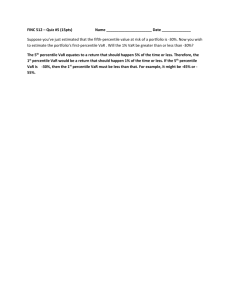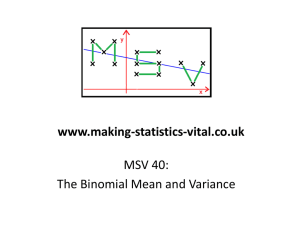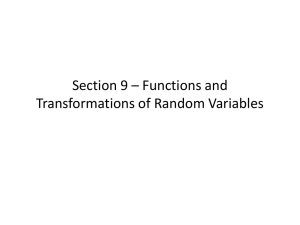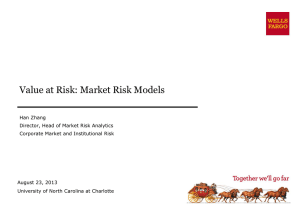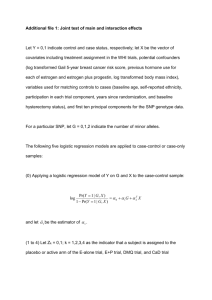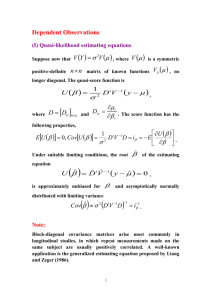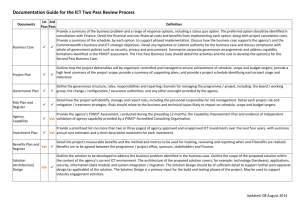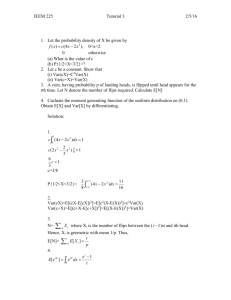6.2 Independent observations
advertisement
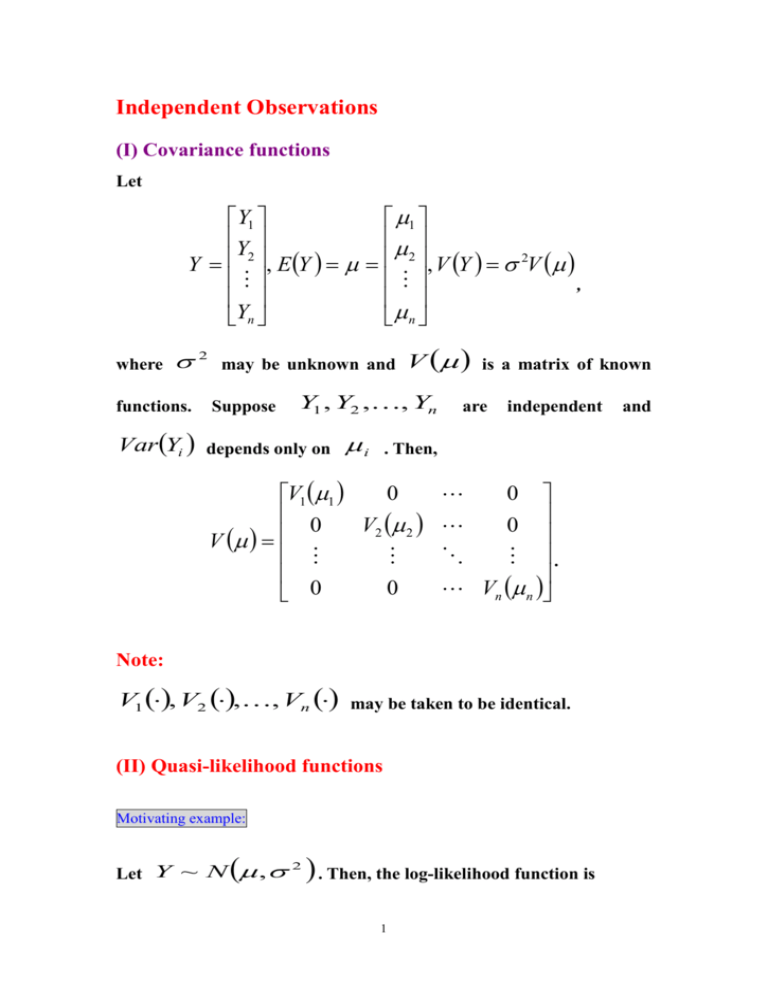
Independent Observations (I) Covariance functions Let Y1 1 Y 2 Y , E Y 2 , V Y 2V , Yn n where 2 functions. may be unknown and Suppose V is a matrix of known Y1 , Y2 ,, Yn are independent VarYi depends only on i . Then, 0 V1 1 0 V2 2 V 0 0 . Vn n 0 0 Note: V1 , V2 ,, Vn may be taken to be identical. (II) Quasi-likelihood functions Motivating example: Let Y ~ N , . Then, the log-likelihood function is 2 1 and 2 y l 2 2 . Thus, the score function for is s l y 2 . Note that y y st dt y t 2 1 t2 |y dt 2 yt 2 1 2 y2 2 y y 2 1 2 y 2 2 y 2 y 2 2 2 1 y 2 2 2 l ◆ Denote U Y 2V . U has the following properties in common with the score function: E U 0, Var U E U 2 U 1 E 2 V . Then, since the score function is the derivative of the log-likelihood function, the integral 2 Q y y t dt 2V t , if exists, should behave like a log-likelihood function for under the very mild assumptions. Q is referred to as the quasi-likelihood, or as the log quasi-likelihood for based on the data y. Example: Y 2 U Var Y Let V . Then, and 2 . y t y 2t dt 1 y dt 1 dt y 2 y t Q 1 2 y log t | y y y log 2 1 1 2 y y log y y log the log - likelihood of Poisson random vaiable Example: Y 2 2 2 U V Var Y Let . Then, and 2 2 . 3 y t y 2t 2 dt 1 1 y 2 2 dt dt y t y t Q 1 y | y log t |y 2 t 1 y 1 log log y 2 1 1 y log 2 1 log y 2 y log the log - likelihood of Gamma random variable E Y , then Note that for a Gamma random variable Y with VarY 2 ◆ The quasi-likelihood function for the complete data is the sum of the individual contributions Q n Qi i i 1 n i 1 i yi yi t dt 2Vi t . The quasi-deviance function corresponding to a single observation is D , y 2 Q 2 2 y which does not depend on y t dt , V t 2. (III) Parameter estimation Let the parameters of interest, p1 , related to the dependence of on the covariate x. Therefore, we can write i i . 4 Thus, Qi i Qi i i yi i Dir , 2 r i r Vi i where Dir i . Therefore, r Q n Qi i n yi i 2 Dir r r i 1 i 1 Vi i V11 1 0 0 V21 2 Dnr 0 0 1 D 2 1r 1 t 1 DrV y 2 D2 r where Dr D1r D2 r y1 1 y 2 2 Vn1 n yn n 0 0 Dnr . Further, t Q 1 t 1 y , D V 2 U where Dn p D1 D2 Dp D11 D 21 Dn1 D12 D22 Dn 2 D1 p D2 p . Dnp The covariance matrix of U is E U U t U E i VarU 1 2 D tV 1 D 5 Note: Under the usual limiting conditions on the eigenvalues of i , the asymptotic variance-covariance matrix of ̂ is Var ˆ i1 2 DtV 1 D 1 . That is, i plays the same role as the Fisher’s information for ◆ ordinary likelihood functions. ̂ , the Fisher’s scoring method To obtain the parameter estimate is ˆ n 1 ˆ tVˆ 1D ˆ ˆn D n n n 1 ˆ tVˆ 1 y ˆ , n 0,1, , D n n n where ˆ D ˆ , Vˆ V ˆ , ˆ ˆ D n n n n n n To estimate 2 , we can use the following statistic ~ 2 where X 2 . n Yi ˆ i X 2 1 n p i 1 Vi ˆ i n p 2 , is the generalized Pearson statistic. Note: Vi Yi 2Vi i 2 Y i Var Yi Var Yi i Var i Vi i Vi i V i i Var Z i , Z i Yi i Vi i 6 Thus, the statistic similar to the sample variance is 2 Yi ˆ i n 2 Zi 2 n ˆ Vi i i 1 Yi ˆ i 1 i 1 n p n p n p i 1 Vi ˆ i n 7 .
